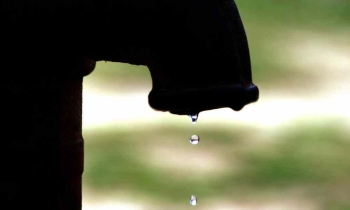Back in March 2004, Mukesh Kapila, the top U.N. official in Sudan at the time, grabbed the media limelight for Darfur by appearing on BBC Radio 4's Today Programme and describing the conflict as "ethnic cleansing" and "the world's greatest humanitarian crisis". He compared the killing that began in Sudan's western region in early 2003 to Rwanda, and asked why the world wasn't doing more.
His comments opened the media floodgates, pushing Darfur onto the front pages. Greg Barrow, senior public affairs officer for the World Food Programme and a former BBC journalist, describes 2004 as a "vintage year" for coverage of Darfur.
As our graph of media coverage shows, since a spike in the summer months of 2004, Darfur has been less successful in the battle for editors' attention. This is partly because it's had to compete with other big crises including the Indian Ocean tsunami, Kashmir quake, Hurricane Katrina and of course Iraq. "News organisations don't have limitless space and budgets," Barrow reminded a recent conference on Darfur at London's Roehampton University.
Keeping the spotlight on long-running humanitarian emergencies is notoriously difficult, particularly when the situation doesn't seem to change much - either for better or worse. This, argues Barrow, is Darfur's problem. "The biggest movement of people into camps took place in the early years, and now the dynamic side of the story has stopped," he said.
Logistics are another obstacle. Sean Maguire, Reuters political and general news editor for Europe, the Middle East and Africa, noted how onerous and expensive it has become for journalists to work in Darfur. "Khartoum throttles access through the need for permits and bureaucratic hurdles. And once you're there, it's difficult and dangerous."
This means few foreign reporters make it onto the ground, although access has improved since February, when the government lifted a three-month ban on journalists.
"There is some good and brave reporting. But it's a bit hit and miss, and the sporadic nature can make it a bit reductive," said Maguire. "Journalists are writing the same story, and there's a certain amount of 'groundhogday-ishness'".
Anne Penketh, diplomatic editor of Britain's Independent newspaper, blamed the lower level of coverage on "Darfur editor fatigue". Persuading gatekeepers to run a Darfur story used to be "dead easy", she said, "now everyone is in search of a new angle". Recent efforts include the Guardian's "first climate change war" angle, a Financial Times essay entitled "Deconstructing Darfur" from French philosopher Bernard-Henri Levy, and a Times piece on Israel's reluctance to accept Darfur refugees.
"At the Independent, our editor is always looking for what he calls the 'f*ck me' factor. And that's now lacking in Darfur. I'm quite pessimistic about (the media) finding new angles," said Penketh.
In her view, there are two major strands of the Darfur story that are failing to make it onto the news agenda: the peace negotiations and what she called the "diplomatic disaster" - meaning the apparent inability of the international community to bring an end to the conflict.
According to Reuters' Maguire, one key problem is the complexity of developments in Darfur. "The fragmentation of the rebels makes it hard to present as black and white," he said.
So with the politics of Darfur no longer doing it for editors, journalists are left casting around for new humanitarian angles. Nothing wrong with that, you might argue, except that this kind of story often tends towards cliches of "starving kids and people chopping each other up", according to the WFP's Barrow.
But is this partly the fault of aid agencies, who often facilitate journalists' trips to Darfur? As Barrow points out, "camps for the displaced are not the most exciting destination for the media".
According to Barrow, the days are over when aid agencies used to fly journalists in on planes with VIPs and then let them slip away to do their job. Now Khartoum wants to know the reporter is on the same flight out.
Some journalists have tried to vary their approach by hooking up with militia, rebels or African Union peacekeepers, or avoiding Khartoum by going into Darfur via the border with Chad. But all this takes time and money that many media outlets either don't have or aren't prepared to dedicate to the story.
Barrow says one consequence of the Western media's disengagement from Darfur is that news gathering is being effectively contracted out to aid agencies, raising questions about editorial independence. But perhaps material generated by aid agencies is better than none?
"The public have got hold of Darfur, and I think it does have traction," said Penketh. "But writing about Darfur is hard now and I think it will get harder."









